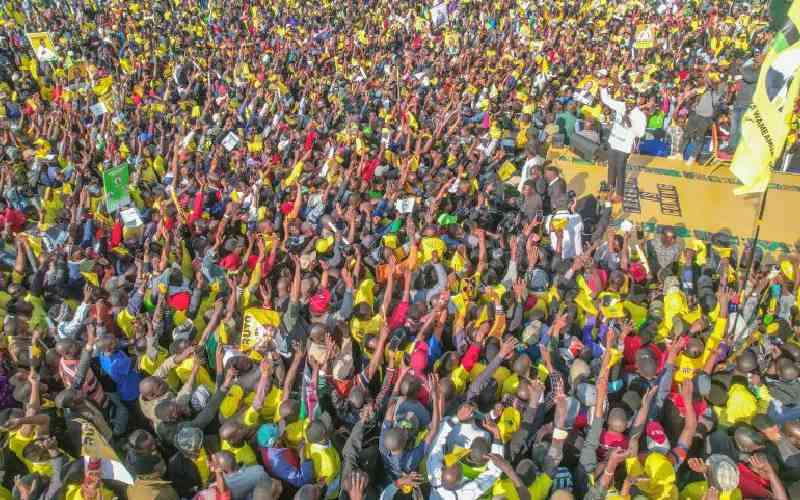
Since the re-introduction of multiparty democracy, Kenya's politics have been largely ethnic-based if regional results of past general elections are anything to go by.
While the country takes pride in its ethnic diversity, this has been one of its biggest undoing on unity and peace especially in top political leadership.
"Every other thing in Kenya is excellent, the only problem is tribalism," Tanzania's late President John Magufuli told Kenyans during a 2016 state visit.
Kenya's politics has been marked by the longstanding perception that members of a particular tribe automatically support a certain presidential candidate otherwise known as 'Mtu wetu' syndrome.
This perception which is however not universal for all Kenyan voters, has been one of the main recipes precipitating electoral violence during transition periods.
"Ethnicity has been used for long to profile people where the country experiences political turbulence. 2022 elections however rose above this," said Dr Phillip Chebunet, a political analyst.
The University of Eldoret lecturer said though there has emerged contestations on the presidential results, the country won't experience electoral violence.
"This has been aided by change in political discourse from ethnic grouping to issue-based politics. For the first time in history, policies moved Kenyans more than tribes," said Chebunet.
He attributed the prevailing peace to the two leading presidential candidates William Ruto and Raila Odinga who emphasized more on their manifestos during their campaigns.
"In this election, the tribe became an added advantage and not the main determinant. Going forward, tribal politics will fade out as manifestos continue to take precedence," he said.
Efforts to stop ethnic violence instigated by differences in political affiliation on tribal lines formed one of the main pillars that led to formation of the Jubilee administration in 2013.
President Uhuru Kenyatta's pact with his deputy William Ruto in 2012 stopped years of rivalry among their respective communities with the duo vowing to change Kenya's politics.
"Never again shall a Kenyan rise against his fellow Kenyan because of an election," the two leaders vowed on several occasions since they rose to power.
Whether by design or by chance, Chebunet said Uhuru and Ruto have greatly achieved this pledge citing political tolerance witnessed after results of this year's polls were announced.
"Although Ruto and Uhuru parted ways, political tolerance remained their clarion call. The peaceful celebrations and demonstrations without infringing on each other's rights are an indicator of the growing tolerance and maturing democracy," said Chebunet.
Herman Manyora, a lecturer at the University of Nairobi describes the recent election as a tussle between two friendly teams that could not go to war with each other over the results.
"Looking at Ruto and Raila's teams you will see Kenya against Kenya. There was a representation of nearly all ethnic groups in either camp. The results couldn't split Kenyans," said Manyora.
He added that the country will continue to enjoy peace post-Supreme Court judgment on the petition set to be filed by Raila's camp.
"Kenya is witnessing indirect implementation of what the botched referendum proposed in bringing an end to electoral injustice. Whoever succeeds Uhuru should maintain the country on this track," said Manyora.
Isaac Kahacho, a political analyst noted that tribes that have historically been at war with each other did not cast their votes in the same basket.
"None of the candidates bagged votes of an entire tribe. This has made it difficult for any tribe to point fingers at the other accusing them of betrayal. In such a scenario, there can never be war," said Kahacho.
He said the opening of the Independent Electoral and Boundaries Commission (IEBC) server to the public also made the elections more transparent.
"Kenyans didn't have the anxiety thinking that the IEBC was cooking its own results behind the scenes. Kenyans predicted the results long before the official announcement," said Kahacho.
Kahacho added that the harsh economic times have also made majority of Kenyans focus their energy on their survival instead of current competitive politics.
 The Standard Group Plc is a multi-media organization with investments in media
platforms spanning newspaper print
operations, television, radio broadcasting, digital and online services. The
Standard Group is recognized as a
leading multi-media house in Kenya with a key influence in matters of national and
international interest.
The Standard Group Plc is a multi-media organization with investments in media
platforms spanning newspaper print
operations, television, radio broadcasting, digital and online services. The
Standard Group is recognized as a
leading multi-media house in Kenya with a key influence in matters of national and
international interest.
